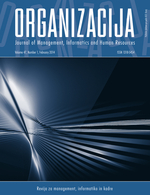Industry 4.0 and the New Simulation Modelling Paradigm
Abstract
Background and Purpose: The aim of this paper is to present the influence of Industry 4.0 on the development of the new simulation modelling paradigm, embodied by the Digital Twin concept, and examine the adoption of the new paradigm via a multiple case study involving real-life R/D cases involving academia and industry.
Design: We introduce the Industry 4.0 paradigm, presents its background, current state of development and its influence on the development of the simulation modelling paradigm. Further, we present the multiple case study methodology and examine several research and development projects involving automated industrial process modelling, presented in recent scientific publications and conclude with lessons learned.
Results: We present the research problems and main results from five individual cases of adoption of the new simulation modelling paradigm. Main lesson learned is that while the new simulation modelling paradigm is being adopted by big companies and SMEs, there are significant differences depending on company size in problems that they face, and the methodologies and technologies they use to overcome the issues.
Conclusion: While the examined cases indicate the acceptance of the new simulation modelling paradigm in the industrial and scientific communities, its adoption in academic environment requires close cooperation with industry partners and diversification of knowledge of researchers in order to build integrated, multi-level models of cyber-physical systems. As shown by the presented cases, lack of tools is not a problem, as the current generation of general purpose simulation modelling tools offers adequate integration options.
Design: We introduce the Industry 4.0 paradigm, presents its background, current state of development and its influence on the development of the simulation modelling paradigm. Further, we present the multiple case study methodology and examine several research and development projects involving automated industrial process modelling, presented in recent scientific publications and conclude with lessons learned.
Results: We present the research problems and main results from five individual cases of adoption of the new simulation modelling paradigm. Main lesson learned is that while the new simulation modelling paradigm is being adopted by big companies and SMEs, there are significant differences depending on company size in problems that they face, and the methodologies and technologies they use to overcome the issues.
Conclusion: While the examined cases indicate the acceptance of the new simulation modelling paradigm in the industrial and scientific communities, its adoption in academic environment requires close cooperation with industry partners and diversification of knowledge of researchers in order to build integrated, multi-level models of cyber-physical systems. As shown by the presented cases, lack of tools is not a problem, as the current generation of general purpose simulation modelling tools offers adequate integration options.
Refbacks
- There are currently no refbacks.

